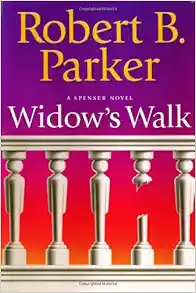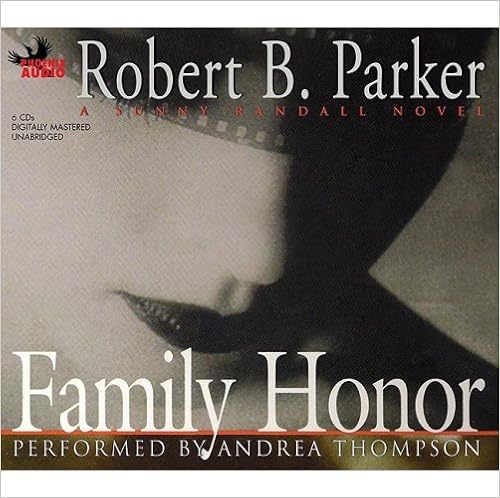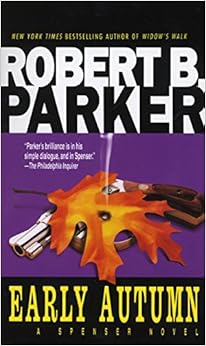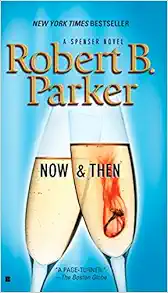
Description
It's good to see private eye Spenser back in Boston, after his ludicrous imitation of a frontier lawman in Robert B. Parker's Potshot . But he's getting nowhere investigating the gunshot murder of banker Nathan Smith in Widow's Walk . The cops figure Smith's ingenuous but unfaithful young wife, Mary, pulled the trigger. She denies it. Spenser, hired by former prosecutor Rita Fiore to help build Mary Smith the best defense her money can buy, isn't sure either way, and the more time he spends on this case (dense with business and sexual deceptions), the more perplexed he becomes. Of course, our poetry-spouting hero finally catches a break by linking Smith's demise to a convoluted real-estate scam. The rest of the novel offers plenty of Parker's characteristically witty dialogue, the slayings of several informants that you know from the get-go are toast, and ample opportunities for Spenser and his robustly menacing sidekick, Hawk, to intimidate lesser thugs. Unfortunately, the author isn't as attentive to the needs of other series regulars, including Spenser inamorata Susan Silverman, whose restrained jealousy toward lawyer Fiore ("Rita is sexually rapacious and perfectly amoral about it. I'm merely acknowledging that") and self-flagellation over a gay client's suicide somehow add no new depth to her character. Parker has a propulsive prose style and can still concoct engrossing stories; his 2001 standalone Western, Gunman's Rhapsody , is a fine example. Widow's Walk doesn't quite meet that standard. Though entertaining, it's an unsatisfying chapter in a series that's become too predictable. --J. Kingston Pierce From Publishers Weekly Last year Parker published three strong novels including the excellent Spenser mystery Potshot. So he's entitled to a miss and a pass and gets one with this forgettable Spenser entry. Attorney Rita Fiore, who's worked with the Boston PI before, hires Spenser to find out if her new client, Mary Smith, whom Spenser's cop pal Quirk describes as "dumber than my dick," indeed shot to death her husband, banker and Mayflower descendant Nathan Smith, as the evidence indicates. Spenser's search for the truth takes him into one of the most confusing (for the PI and the reader) cases of his long career; unusual for Parker, pages are needed at book's end to explain who did what and why. Sidekick Hawk pitches in to protect Spenser, and gunsel Vinnie Morris lends a hand, too, as several folks Spenser talks to wind up dead, and as the PI is trailed, then attacked, by thugs headquartered at a crooked land development company with ties to the dead man's bank. Susan, Spenser's beloved, offers some advice as well, but the ritual appearances by Spenser's crew, human and animal (Pearl the Wonder Dog, ancient and slow, waddles in here and there), while earning a nod of gratitude from series fans, do little to advance or deepen the proceedings. The novel stirs to life only fitfully, most notably in the confrontational exchanges between a female lawyer implicated in the crimes and her powerful attorney father; here, Parker taps into truth about familial loyalties. The writing is as clean as fresh ice, and from the opening sentence (" `I think she's probably guilty,' Rita Fiore said to me"), it's clear that readers are in the hands of a vet who knows what he's doing; but what Parker is doing here is, alas, not very interesting. (Mar. Copyright 2002 Cahners Business Information, Inc. From Library Journal Parker has his hands full defending a brassy young blonde with a shady past who really does seem to have shot her 51-year-old hubby in the head. Copyright 2001 Reed Business Information, Inc. From Booklist Authors of long-running series must choose between allowing their characters to age--and, thus, signing their death warrants--or somehow letting them remain fixed in time as the world changes around them. Spenser fans know that Parker's inimitable Boston sleuth is a veteran of the Korean War, which would make him in advance of 70 today. But the Spenser we know and love plays to a perpetual 40, able to muse on aging and act a little crotchety now and again but still spry enough to kick heads with gusto or perform heroic deeds in the bedroom. He does plenty of both this time, in his twenty-eighth outing. A banker is found in bed with a bullet hole in his head, and his much younger and seemingly dense wife is accused of the murder. Spenser is hired by the defense to investigate, and he quickly develops his plan, which his longtime lover, Susan, describes as "blundering along annoying people." With the help of the imperturbable Hawk (also ageless), Spenser blunders along with his usual style: world-class banter combined with a world-class left hook. This is hardly a pivotal episode in the series, but it delivers the jaunty entertainment we've come to expect from Parker, even when he's running on cruise control. Spenser, Hawk, and Susan have always been fantasy figures living in a realistic world. They give us pleasure by doing the things we can only dream of doing, and that very definitely includes turning off the timer at age 40. Bill Ott Copyright © American Library Association. All rights reserved Robert B. Parker was the author of more than fifty books. He died in January 2010. Excerpt. © Reprinted by permission. All rights reserved. ONE "I think she's probably guilty," Rita Fiore said to me. We were in her office, high up, with a view of the harbor. "And you're her lawyer," I said. " Tells you about her case," Rita said. She sat on the edge of her desk in front of me, her thick red hair gleaming. She had on a black suit with a very short skirt. Rita knew her legs were good. "But you'll represent her anyway." "Like everyone else," Rita said, "she's entitled to the best defense she can get." "Or afford," I said. Rita smiled. "Or afford." "She got money?" "Oodles," Rita said. "Last time I worked for you," I said, "I almost got killed." "I know," Rita said. "We could give you hazardous-duty pay." "It's all hazardous duty," I said. "Tell me about your client." "Mary Smith." "Mary Smith?" "Honest to God," Rita said. "It's her real name. She was married to the victim, Nathan Smith. Her maiden name was Toricelli." "She have oodles of money before she married him?" I said. "No." "Ah ha!" "Ah ha?" "It's an investigational term," I said. "That where the oodles come from?" "Yes." "They the same age?" "He married her when she was twenty-three and he was fifty-one." "Prior marriages?" "None. For either." "How old is she now?" "Thirty." Rita had her legs crossed. She bounced the top leg a little, looking at the point of her shoe. The shoe had a very high heel. It looked uncomfortable. But good. "Anyone else in her life?" Rita shook her head sadly. "God," she said. "You're a cynical bastard." "Anyone?" "Cops suspect her of an affair or two." "With?" Rita smiled. "You want them in chronological order?" she said. "Or alphabetically?" "You can give me a list," I said. "What's the prosecution's case?" "He was discovered naked in his bed with a hole in his head made by a forty-caliber slug." "They find the bullet?" "Yes. After it went through his head it tore through the mattress and lodged in the baseboard. Angle of the shot suggests that it was fired by someone in bed beside him." "She have an alibi?" "No. She says she was downstairs in the library watching television." "She hear the shot?" "No. Says the TV was on loud and her door was closed so as not to wake him up." "So she found him that way when she went up to bed." "Yes. They didn't share a bedroom, but she usually stopped in to say good night." "Did he normally sleep naked?" I said. "I don't know." "Okay," I said. "She's a good candidate. But they got to have more than that to prosecute." "They had a huge fight earlier in the evening. He actually slapped her." "Witnesses?" "Two dozen. It was a big cocktail party in Brookline." "And I assume she's his heir," I said. "Yes." "And there's more," I said. "Unfortunately, yes. Prosecution has a witness who says she tried to hire him to kill her husband." "And he declined?" "He says he did." "He make a deal for his testimony?" "Yes. They picked him up for something unrelated. He said if they could work something out, he could help them with this case." "Which is a high profiler," I said. "The Smiths first came to Boston on the Mayflower," Rita said. "The Mayflower didn't come to Boston," I said. "Well, they've been here a long time," Rita said. "But the cops can't put her in the room when the gun went off," I said. "No." "No powder residue on her hands." "No. But he did." "Shot at close range," I said. "Put his hands up to try and stop the bullet?" "That's the police theory." "Everybody knows about powder residue anyway," I said. "She could have worn gloves." "Police didn't find them." "You can flush those latex jobs down the toilet like a condom." "I've heard that can happen," Rita said. "I'll bet you have," I said. "I meant about the gloves," Rita said. "Oh." "There is probably more," Rita said. "But that's what I know they've got so far." "You think they can convict her on that?" I said. "Motive, and opportunity, prior solicitations to murder. Plus the jury won't like her." "Because?" "Because she's what my mother would have called cheap. She's too pretty, too made up, too blond, lot of attitude, drinks to excess, probably does dope, sleeps around." "Sounds like a great date," I said. "And her diction is bad," Rita said. "She sounds uneducated." "Juries don't like that?" "They are more inclined to think you're innocent if you sound like Barbara Walters," Rita said. "You think Barbara would be a good date?" "Oh, oink," Rita said. "You think the prosecution knows stuff they haven't told you?" I said. Rita had thick dark red hair which glinted in the sunlight that streamed through her big picture window. "Maybe," she said. "What about full disclosure?" I said. "What about the Easter bunny?" Rita said. "You want to see what you can find out?" "Sure." --from Widows Walk by Robert B. Parker, Copyright © March 2002, The Putnam Publishing Group, a division of Penguin Putnam, Inc., used by permission. Read more
Features & Highlights
- When fifty-one-year-old Nathan Smith, a prominent local banker and millionaire, is murdered, Spenser is called in to investigate Nathan's young wife, Mary Smith, who has a weak alibi, likes to sleep around, and is despised by her peers, and as the evidence stacks up against Mary, Spenser soon discovers that Mary's mysterious past has put his own life in danger. 175,000 first printing.





